Apr 09, 2025
Apr 09, 2025
The 1960s – Golden Years – Part 6
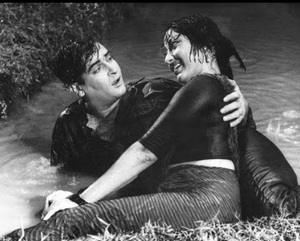 Shammi Kapoor continued to revel in his newfound avatar of a singing, prancing lover, inventing his own moves to the beats of the songs, which were often composed to his dictates. We soon got tired of watching his jerky gyrations and over-the-board serenading and gave low priority to watching his films. During this period, he had several hits, Junglee, Professor, Dil Tera Diwana, China Town, and Boy Friend.
Shammi Kapoor continued to revel in his newfound avatar of a singing, prancing lover, inventing his own moves to the beats of the songs, which were often composed to his dictates. We soon got tired of watching his jerky gyrations and over-the-board serenading and gave low priority to watching his films. During this period, he had several hits, Junglee, Professor, Dil Tera Diwana, China Town, and Boy Friend.
Junglee was a light-hearted musical, produced and directed by Subodh Mukherjee, starring Shammi Kapoor and Saira Banu. This was the debut film of Saira Banu, the daughter of Naseem Banu, the leading actress of the 1940s. Shammi Kapoor fully exploited his new image since Tumsa Nahin Dekha. Several songs composed by Shankar Jaikishan were popular. Lata Mangeshkar’s Kashmir ki kali hun main, Mohammed Rafi’s Ehsan tera hoga mujhpar, and Chahe Koi Mujhe Junglee Kahe became hits. Rafi’s Ai Ai ya suku suku was adapted from Ai ai ai the beat is crazy sucu sucu is everywhere by Nina and Frederick (1961).
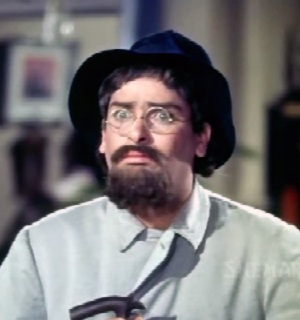 Professor, written by Abrar Alvi, was first launched by Guru Dutt in the late 1950s. It starred Kishore Kumar and Waheeda Rehman. As per prevalent practice, the first few reels were shown to the censor board to avoid confrontation with censors later. The censor board rejected the film because they felt the storyline of a lady and her niece falling in love with the same senior professor was in poor taste. Guru Dutt decided to shelve the film. Abrar Alvi gave the script to Lekh Tandon, and they read it out to Shammi Kapoor.
Professor, written by Abrar Alvi, was first launched by Guru Dutt in the late 1950s. It starred Kishore Kumar and Waheeda Rehman. As per prevalent practice, the first few reels were shown to the censor board to avoid confrontation with censors later. The censor board rejected the film because they felt the storyline of a lady and her niece falling in love with the same senior professor was in poor taste. Guru Dutt decided to shelve the film. Abrar Alvi gave the script to Lekh Tandon, and they read it out to Shammi Kapoor.
Lekh Tandon’s grandfather and Prithviraj Kapoor had been friends. Lekh's brother Yograj worked as assistant director and secretary to Prithviraj Kapoor. Lekh Tandon was Assistant Director to Kidar Sharma in Neki Aur Badi (1949), Bawre Nain (1950) and Shokhiyan (1951). Shammi Kapoor liked the script but wanted Nasir Hussain or Shakti Samanta to direct the film. When Lekh Tandon refused to part with the script, Shammi Kapoor imposed a condition that if he did not like Lekh Tandon’s work after completion of three reels, he would replace Lekh Tandon with a director of his choice. He never had to exercise his option.
Professor tells the story of a young man desperately in need of a job for his mother’s medical treatment. He finds a job as a teacher to two teenage girls, but their aunt and guardian insists on employing only a middle-aged man. The hero puts on a disguise to fulfill the condition and falls in love with one of his students. The aunt, in turn, falls for the teacher creating a difficult situation for the hero. The story gives enough scope to Shammi Kapoor to indulge in his bag of tricks, with two newcomers Kalpana and Praveen Chowdhary as the two pupils. Lalita Pawar once again shows her prowess as a middle-aged woman finding love. One of the most unforgettable scenes in the film is Lalita Pawar wearing a rich, colourful sari, instead of her austere, uniform-looking sari, standing in front of a mirror, with her hair dyed, humming Prem nagar mein banaaoongi ghar main. Music directors Shankar-Jaikishan won a Filmfare Award for Professor. Mohammed Rafi’s Ae gulbadan, Khuli palak mein jhootha gussa, and Mohammed Rafi and Lata Mangeshkar’s duets Main chali main chali and Aawaz deke humein tum bulao were megahits.
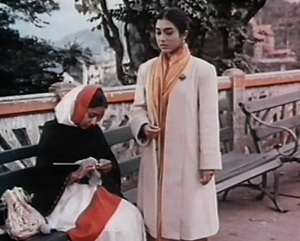 Satyajit Ray’s first colour film Kanchenjunga, set in Darjeeling was released in Calcutta at the same time. As an ardent follower of his films, I watched Kanchenjunga on priority. When I mentioned the film to one of my friends, he said that he was disappointed with the film and advised me to watch Professor, which exploited the scenic beauty of Darjeeling much better. Satyajit Ray uses the changing weather of Darjeeling as a parabole for the development of his story. Kanchenjunga remains covered in mist till the last scene. There are no picture postcard shots of the beautiful hill station. On the other hand, Professor is located in Darjeeling for no particular reason. Cinematographer Dwarka Divecha made full use of the locales to create picture paintings of Darjeeling.
Satyajit Ray’s first colour film Kanchenjunga, set in Darjeeling was released in Calcutta at the same time. As an ardent follower of his films, I watched Kanchenjunga on priority. When I mentioned the film to one of my friends, he said that he was disappointed with the film and advised me to watch Professor, which exploited the scenic beauty of Darjeeling much better. Satyajit Ray uses the changing weather of Darjeeling as a parabole for the development of his story. Kanchenjunga remains covered in mist till the last scene. There are no picture postcard shots of the beautiful hill station. On the other hand, Professor is located in Darjeeling for no particular reason. Cinematographer Dwarka Divecha made full use of the locales to create picture paintings of Darjeeling.
BR Pantulu’s Dil Tera Diwana is the remake of his successful Tamil film Sabash Meena (1958). Its story has elements of drama familiar to Indian viewers, exchange of characters, mistaken identity, etc. With Shammi Kapoor’s mannerisms and tricks, and comedian Mehmood in the cast, the director does not make up his mind whether to make a comedy or a serious film. Dil tera deewana hai sanam tuned by Shankar Jaikishan and sung by Mohammed Rafi and Lata Mangeshkar was a hit. Shakti Samanta’s China Town was a thriller located in Kolkata’s China Town, with Shammi Kapoor in a double role, Shakila and Helen. The film is known for the song Baar Baar Dekho, tuned by Ravi and sung by Mohammed Rafi.
Naresh Saigal’s Boy Friend was a remake of Bombay Talkies blockbuster film Kismet (1943) starring Ashok Kumar, with some changes in the script. Madhubala was cast opposite Shammi Kapoor with Dharmendra in a supporting role. The film was moderately successful. The songs composed by Shankar Jaikishan were very ordinary. Mujhe apna yaar banaa lo sung by Mohammed Rafi became popular. Amirbai Karnataki who had sung the hit songs Ab tere siwa kaun mera krishan kanhaiya, Dheere dheere aa re badal and Ghar ghar mein diwali hai mere ghar mein andhera in Kismet played the hero’s mother in Boy Friend.
Rajendra Kumar continued his dream run with Gharana, Aas Ka Panchhi, Sasural, Zindagi aur Khwab, and Pyar Ka Sagar.
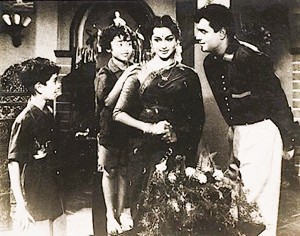 Gemini films’ Gharana, directed by SS Vasan, is a remake of the Telugu movie Shanti Nivasam, a family drama starring Rajendra Kumar, Raaj Kumar, Asha Parekh, and Telugu actress Devika. Music director Ravi's compositions, Mohammed Rafi’s Husnwale tera jawab nahin, Rafi and Asha Bhonsle’s duet Jabse tumhe dekha hai and Dadi amma dadi amma man jao sung by Asha Bhonsle and Kamal Barot were hits. Filmyug’s Aas Ka Panchhi, directed by Mohan Kumar was a lost and found love story with a war background, starring Rajendra Kumar and Vyjayantimala. Music directors Shankar-Jaikishan introduced Bengali singer Subir Sen to Hindi audiences with Dil mera ek aas ka panchhi. Prasad Productions Sasural, directed by T Prakash Rao was the remake of Telugu hit film Illarikam. It was a family drama starring Rajendra Kumar and B Saroja Devi, with music by Shankar Jaikishan. Teri pyari pyari surat ko sung by Mohammed Rafi became a hit. Zindagi aur Khwab, directed by S Bannerjee, was a romantic drama starring Rajendra Kumar and Meena Kumari with music by Dattaram. Kehti hai jhuki jhuki nazar sung by Suman Kalyanpur and her duet with Manna Dey Na jane kahan hum they were hits. Pyar Ka Sagar, produced and directed by Devendra Goel, was a remake of Goel’s debut film Aankhen, which was also Madan Mohan’s debut film. Pyar Ka Sagar starred Rajendra Kumar, Meena Kumari, and Madan Puri and had music by Ravi. Pyar ka sagar dekha hai kisike chanchal nainon mein by Asha Bhonsle and Mukesh, Mujhe pyar ki zindagi denewale by Asha Bhonsle and Mohammed Rafi, and Mukesh solos Sada khush rahe tu jafa karnewale and wafa jinse ki bewafa ho gaye were popular songs.
Gemini films’ Gharana, directed by SS Vasan, is a remake of the Telugu movie Shanti Nivasam, a family drama starring Rajendra Kumar, Raaj Kumar, Asha Parekh, and Telugu actress Devika. Music director Ravi's compositions, Mohammed Rafi’s Husnwale tera jawab nahin, Rafi and Asha Bhonsle’s duet Jabse tumhe dekha hai and Dadi amma dadi amma man jao sung by Asha Bhonsle and Kamal Barot were hits. Filmyug’s Aas Ka Panchhi, directed by Mohan Kumar was a lost and found love story with a war background, starring Rajendra Kumar and Vyjayantimala. Music directors Shankar-Jaikishan introduced Bengali singer Subir Sen to Hindi audiences with Dil mera ek aas ka panchhi. Prasad Productions Sasural, directed by T Prakash Rao was the remake of Telugu hit film Illarikam. It was a family drama starring Rajendra Kumar and B Saroja Devi, with music by Shankar Jaikishan. Teri pyari pyari surat ko sung by Mohammed Rafi became a hit. Zindagi aur Khwab, directed by S Bannerjee, was a romantic drama starring Rajendra Kumar and Meena Kumari with music by Dattaram. Kehti hai jhuki jhuki nazar sung by Suman Kalyanpur and her duet with Manna Dey Na jane kahan hum they were hits. Pyar Ka Sagar, produced and directed by Devendra Goel, was a remake of Goel’s debut film Aankhen, which was also Madan Mohan’s debut film. Pyar Ka Sagar starred Rajendra Kumar, Meena Kumari, and Madan Puri and had music by Ravi. Pyar ka sagar dekha hai kisike chanchal nainon mein by Asha Bhonsle and Mukesh, Mujhe pyar ki zindagi denewale by Asha Bhonsle and Mohammed Rafi, and Mukesh solos Sada khush rahe tu jafa karnewale and wafa jinse ki bewafa ho gaye were popular songs.
Sunil Dutt acted in three successful films other than Chhaya, Usne Kaha tha and Hum Hindustani, namely Ek Phool Char Kante, Main Chup Rahungi, and Jhoola.
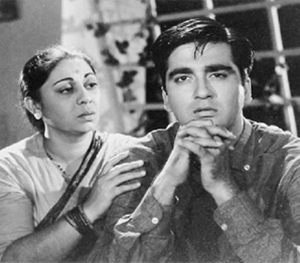 Ek Phool Char Kante, directed by Bhappi Sonie in his directorial debut stars Sunil Dutt, and Waheeda Rehman. It is an engaging comedy in which the hero tries to impress the heroine’s four uncles with diverse fads to win her hand. Matwali naar thumak thumak chali jaye sung by Mukesh and tuned by Shankar Jaikishen became popular. AVM’s Main Chup Rahungi, directed by A. Bhimsingh, was a remake of the 1960 Tamil film Kalathur Kannamma. The film stars Meena Kumari and Sunil Dutt in lead roles. It is a typical South Indian tearjerker which got Meena Kumari a nomination for Best Actress in the Filmfare Awards. Abounding in stock characters which were a staple in South Indian films, it tells the story of a benevolent zamindar who draws a line against his son marrying the daughter of a farmer who is a beneficiary of his munificence, in the interests of his Khandan ki izzat, and blackmails her to keep the marriage a secret. The ideal bharatiya nari daughter-in-law holds her tongue through innumerable sufferings and insults. Chitragupt’s compositions, Lata Mangeshkar’s Tumhi Ho Mata, Pita Tumhi Ho and Lata Mangeshkar and Mohammed Rafi’s duets, Chand Jane Kahan Kho Gaya, and Koi Bata De Dil Hai Jahan, were popular. Jhoola was another South Indian film with a complicated plot and stock characters and events. Produced by N Vasudevan Nair and directed by K Shankar, the film brought Sunil Dutt and Vyjayantimala together after their successful pairing in BR Chopra’s Sadhna, enacting a romance between doctors. Salil Chowdhury composed a couple of lasting tunes in Mohammed Rafi and Lata Mangeshkar’s duet Aag pani mein lagi hai hai kaise and Manna Dey’s Ek samay par do barsaaten, but Sajna mera dil is more like a Salil Chowdhary tune.
Ek Phool Char Kante, directed by Bhappi Sonie in his directorial debut stars Sunil Dutt, and Waheeda Rehman. It is an engaging comedy in which the hero tries to impress the heroine’s four uncles with diverse fads to win her hand. Matwali naar thumak thumak chali jaye sung by Mukesh and tuned by Shankar Jaikishen became popular. AVM’s Main Chup Rahungi, directed by A. Bhimsingh, was a remake of the 1960 Tamil film Kalathur Kannamma. The film stars Meena Kumari and Sunil Dutt in lead roles. It is a typical South Indian tearjerker which got Meena Kumari a nomination for Best Actress in the Filmfare Awards. Abounding in stock characters which were a staple in South Indian films, it tells the story of a benevolent zamindar who draws a line against his son marrying the daughter of a farmer who is a beneficiary of his munificence, in the interests of his Khandan ki izzat, and blackmails her to keep the marriage a secret. The ideal bharatiya nari daughter-in-law holds her tongue through innumerable sufferings and insults. Chitragupt’s compositions, Lata Mangeshkar’s Tumhi Ho Mata, Pita Tumhi Ho and Lata Mangeshkar and Mohammed Rafi’s duets, Chand Jane Kahan Kho Gaya, and Koi Bata De Dil Hai Jahan, were popular. Jhoola was another South Indian film with a complicated plot and stock characters and events. Produced by N Vasudevan Nair and directed by K Shankar, the film brought Sunil Dutt and Vyjayantimala together after their successful pairing in BR Chopra’s Sadhna, enacting a romance between doctors. Salil Chowdhury composed a couple of lasting tunes in Mohammed Rafi and Lata Mangeshkar’s duet Aag pani mein lagi hai hai kaise and Manna Dey’s Ek samay par do barsaaten, but Sajna mera dil is more like a Salil Chowdhary tune.
Raaj Kumar shone in Dil Apna Aur Preet Parayi and in Gharana, paving the way for higher achievements in subsequent years. Manoj Kumar was seen in Hariyali Aur Rasta, Reshmi Rumal, with the hit song Zulfon ki ghata lekar, a Manna Dey and Asha Bhonsle duet tuned by less known music director Babul, Piya Milan ki Aas, Shadi, Dr Vidya, and Banarasi Thug. Only Hariyali Aur Rasta achieved success. Dharmendra, who made his debut in 1960 with Dil Bhi Tera Hum Bhi Tere, starred in Shola Aur Shabnam, a romantic film, written and directed by Ramesh Saigal, with music by Khayyam. Shola Aur Shabnam is about a young man torn between love for his long-lost childhood sweetheart, and devotion towards a friend who has helped set him up in his career. Mohammed Rafi’s Jane kya dhoondhti rahti hain, and Mohammed Rafi and Lata Mangeshkar’s duet Jeet hi lenge baazi were very popular.
Ghunghat, starring Bina Rai, Bharat Bhushan and Pradeep Kumar, is a remake of Telugu film Charana Daasi(1956), an adaptation of Rabindranath Tagore's novel Noukadubi, with the addition of several characters and subplots that tend to obscure the social message in Gurudev’s novel. The film's music is by Ravi, while the lyrics are by Shakeel Badayuni. Laage Na Mora Jiya, and Mori Chham Chham Baje Payaliya sung by Lata Mangeshkar were hit songs from the film. It was a surprise to find Bina Rai winning the Filmfare Award for Best Actress at the 8th Filmfare Awards in 1961, for her performance in Ghunghat, in preference to Madhubala, in Mughal-e-Azam, Nutan in Chhalia and Meena Kumari in Dil Apna Aur Preet Parayi. It raised doubts about the integrity of the Awards. In a conversation with the translators of C Ramchandra’s memoirs, Suraiya had mentioned that she was approached by Filmfare for the Best Actress Award for Mirza Ghalib (1954), in return for a sum of money. Chhabili was produced and directed by Shobhna Samarth to launch her second daughter Tanuja. We were impressed by her bubbly personality and looked forward to great performances in the future. Nutan sang for the first time in films, crooning Aye mere humsafar under the baton of Snehal Bhatkar. Hemant Kumar’s Leharon pe lehar, adapted from Dean Martin’s The man who plays the mandolin became popular.
Among the actresses, Madhubala was the leading lady in as many as six films despite her failing health. With Nargis and Geeta Bali ceasing to act after their respective marriages, the field was open for Meena Kumari, Nutan, Nanda, Mala Sinha, Vyjayantimala, Waheeda Rehman and Asha Parekh to show their mettle. By 1962, Meena Kumari was anointed as the tragedy queen of the Hindi screen. Following Devdas and Musafir, Suchitra Sen continued her foray into Hindi films with Bombai ka Babu and Sarhad, co-starring with Dev Anand but with limited success. Bombai ka Babu was a crime drama loosely based on a story by O’Henry. SD Burman’s compositions, Chal ri sajani ab kya soche, sung by Mukesh, Diwana matwala huwa dil by Asha Bhonsle and Mohammed Rafi, and Saathi na koi manzil, by Mohammed Rafi are still remembered. For Dekhne me bhola hai, by Asha Bhonsle, SD Burman adopted the tune of a Telugu song Eru waka sagaroyi that brought Waheeda Rehman into the limelight. Sarhad, directed by Shankar Mukherjee with music by C Ramchandra failed at the box office.
22-Mar-2025
More by : Ramarao Annavarapu

|
Sir, you are a living encyclopaedia on the subject of Hindi cinema. Beautiful memoirs, bringing back those great days... |

|
Thank you very much Chandra Mouli garu. |

|
It was a period of melodious music, interesting themes and mostly successful films. Good analysis makes reading peppy. Thank you sir. |